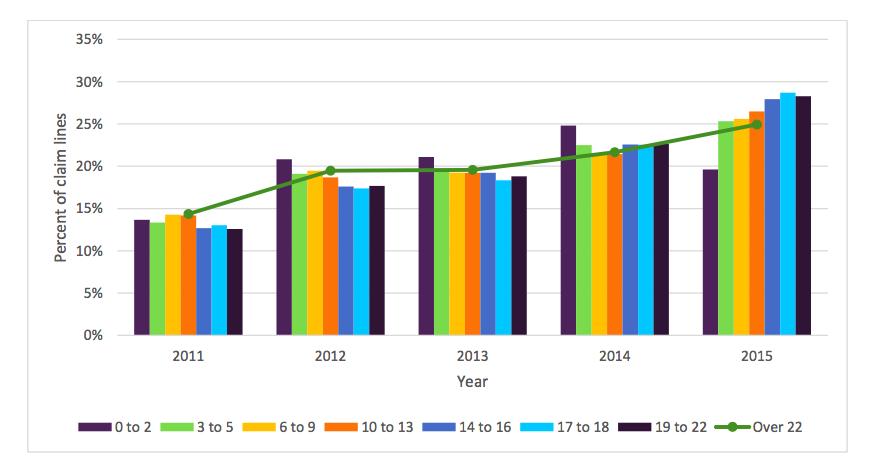Among kids, teens and young adults, private insurance claims for type 2 diabetes more than doubled from 2011 to 2015, according to a new paper from an organization that analyzes healthcare costs and insurance. Obesity claims also increased during this same time period.
The report from FAIR Health adds to the concerning data on obesity and diabetes among youth. While obesity among children has leveled off in recent years, the increase over the past several decades now means more than one in three children and adolescents are overweight or obese.
The findings hold concerning information on cancer risk as these youth may face many decades later.
Children and teens who are overweight are more likely to be overweight adults. Among adults, obesity links to increased risk of 11 cancers. And adults diagnosed with type 2 diabetes are at increased risk of developing cancer. Adults with diabetes are approximately twice as likely to develop cancers of the liver, pancreas and endometrium. Risk also increases for cancers of the colon/rectum, breast (post-menopausal) and bladder.
For the analysis, FAIR Health analyzed five years of healthcare insurance claims from over 21 billion privately billed healthcare claims. The paper focused on children, teens, and adults ages 22 and younger.
Here’s the full white paper by FAIR (pdf), called Obesity and Type 2 Diabetes as Documented in Private Claims Data: Spotlight on This Growing Issue among the Nation’s Youth.

Annual percent of claim lines with a type 2 diabetes diagnosis by age group (in years), 2011- 2015. Source: FAIR Health
Among the paper’s findings, from 2011-2015:
– The claim lines with a type 2 diabetes diagnosis more than doubled among newborns to 22 year olds, an increase of 109 percent
– The percent of claim lines with an obesity diagnosis increased annually in all age groups, from infants and toddlers to adults
– The largest increase among obesity claims from newborns to 22 year olds was among 19 to 22 age group, an increase of 154 percent
– The percent of claim lines with a type 2 diabetes diagnosis more than doubled from newborns to 22 year olds, increasing 109 percent
According to the CDC’s latest National Diabetes Statistics Report, about 208,000 young people under 20 years old have diagnosed diabetes. Most by far are type 1 diabetes, and this represents only 0.25 percent of all people in this age group. Yet as obesity rates in children increase, type 2 diabetes is becoming more common in younger people.
For more on managing and preventing diabetes among young people, the The National Institute of Diabetes and Digestive and Kidney Diseases has a lot of helpful information.
FAIR Health describes itself a national, independent, nonprofit organization dedicated to bringing transparency to healthcare costs and health insurance information through data products, consumer resources and health systems research support.






I believe it’s never too late to learn such lessons for anyone at any age, and self-preservation for our own good can take us a long way. Managing to live with diabetes or constantly fighting to keep it away from yourself takes courage and determination, and is a battle that needs to be fought by each of us every single day to give ourselves the best gift of all – the gift of life. Thanks for sharing a great article.